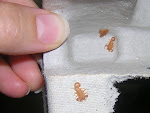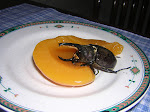 In a place where water is valued like gold, people have pretty strong opinions about what to do with it. In the case of central Arizona's Verde River, issues concerning quality and quantity of water are taking center stage.
In a place where water is valued like gold, people have pretty strong opinions about what to do with it. In the case of central Arizona's Verde River, issues concerning quality and quantity of water are taking center stage.The Verde River is "fed" by the Big Chino aquifer of central Arizona. The river is a perennial water source for which the year-round demands are many
 and growing. Recreation, wildlife habitat, Native American water rights, and drinking water for the Phoenix metropolis (among others downstream) create an eclectic bunch of vested interests. But these aren't the only fingers in the cookie jar. Explosive growth in Yavapai county (southwest of Flagstaff, near the river's headwaters) has prompted a proposal for pumping ground water from the aquifer to supply drinking water for new developments.
and growing. Recreation, wildlife habitat, Native American water rights, and drinking water for the Phoenix metropolis (among others downstream) create an eclectic bunch of vested interests. But these aren't the only fingers in the cookie jar. Explosive growth in Yavapai county (southwest of Flagstaff, near the river's headwaters) has prompted a proposal for pumping ground water from the aquifer to supply drinking water for new developments.The proposed ground water pumping project landed the Verde River on America's Ten Most Endangered Rivers list in 2006. It's been stalled, fought, resisted ever since. But the continued growth and development of Yavapai county during that time seems to confidently say: lost cause.
What happens to a river who's source is sucked up for drinking water?
Pumping water from the aquifer will undermine the Verde River's flow, disrupt habitat, and may lead to squabbling over the remains among current users. What to do about the loss of water? Mitigate. A proposal calls for dumping reclaimed water into the Upper Verde River on an ongoing basis to replace what the aquifer would have provided. I dunno, it wouldn't be the first time it's been done, and there are undoubtedly some success stories from similar rivers. But the idea has a lot of recreationists, environmentalists, and downstream water drinkers expressing concern.
Management should be based on scientific data. That's the position of the local Sierra Club chapter. So they're coordinating with local interests to collect data on the Verde's water quality and flow before the pumping and dumping (my sarcasm, not theirs) begins. Baseline data will provide a frame of reference for "normal" levels of E. coli, nitrogen, phosphorous, arsenic, pH, dissolved solids, etc., and a gaggle of data on flow rate. Toward that end, I volunteered a day with the Sierra Club recently to help collect measurements on the river.
I was impressed with the use and appreciation of this river that we witnessed. I saw the bumper sticker at top prominently displayed on a farm truck along one of our river stops. I don't often see a rural blue collar citizen advocating for conservation... Not here, not usually anyway. A young country couple spending a day on the river with their babies seemed aware of the issues, and pumped us for the latest information on reclaimed water use. As their little ones dipped their toes in the river, it wasn't hard to see their point of concern. Though we managed to avoid them, I was told we may run (literally) into Kayakers who are weekend regulars on the river. There were plenty of fishermen, whom I eyed enviously...
Native American cliff dwellings sit unobtrusively above the banks of the Verde at a few points here and there. Apparently there is such a thing as "First Nation's water rights", which makes the Verde River a concern of the descendants of these dwellings as much as anyone's.
Who knows... With all these forces working together, maybe the Verde River has a chance at avoiding ground water pumping and reclaimed water.
Personally, I don't think so; Arizona has a track record of allowing rampant growth without adequate resources to support it. Ground water from the aquifer will be pumped. Reclaimed water will be used. People will be upset, and it will make headlines (again). But there is still success in this scenario: in the uniting of fishermen and farmers, scientists and recreational enthusiasts, Native Americans, and families spending a lolly gagging Sunday on the river.



+reduced.jpg)


No comments:
Post a Comment